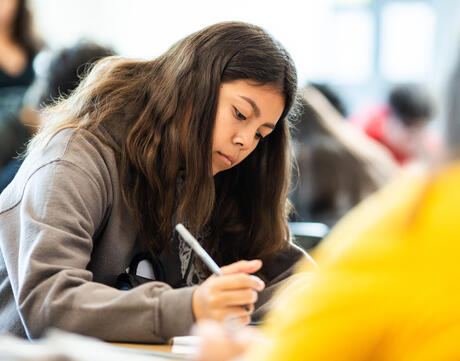
Poetry and Civic Agency
At first glance poetry and civic agency might not seem related to one another, but in fact they share many connections and have been intertwined throughout history.
Although not generally referred to as a poem, Martin Luther King Jr.’s speech “I Have a Dream” is a famous and profound example of someone using lyrical writing to galvanize public opinion and advance ideals of equity in the United States and around the world. Through the art of poetry and the act of civic participation, we can express our beliefs and dreams for the future in order to help shape society’s values and actions.
In April 2024, as we celebrate National Poetry Month, we also find ourselves a third of the way into a presidential election season. As news surrounding national, state, and local races come up in your classroom, your students can leverage poetry to find words for their thoughts concerning our democracy and what they hope to see in our shared civic future. Poetry and civic agency are both powerful tools that can shape our societal values, beliefs, and choices.
“To realize the full potential of our communities, build on our past, and chart paths forward, we need to be able to imagine what better worlds look like… even now, especially now.”
- The Civic Imagination Project
Poetry has the ability to evoke emotions and inspire empathy, enabling individuals to connect with the experiences and perspectives of others. Through vivid imagery, metaphors, and rhythmic language, poets can shed light on social issues, injustices, and the human condition, thereby fostering a sense of collective responsibility and motivating individuals to take action.
Poets have often used their craft to critique oppressive systems, amplify marginalized voices, and call for justice. By giving voice to the voiceless and shedding light on inequalities, poetry can empower individuals to question existing power structures and actively engage in civic discourse and activism.
Facing History has collected a list of poetry resources and examples of civic-minded poets and their works. We hope this list will inspire your students to find space for civic dialogue, reflection, and engagement through poetry.
Glossary: Political Poetry
Poets.org shares a write up about what defines political poetry, citing examples through the centuries. In a related article, readpoetry.com suggests 22 poems available to read via poets.org that touch on an array of political and social moments and movements.
Activity: Slow Down with The Slowdown
Use poetry as a spark for reflection and discussion with your students about what’s happening in their lives and the world.
Teaching Strategy: Found Poems
Pulling out only words, phrases, or quotations from a text that they find meaningful, students compose a poem—this could include text from anywhere, including a news source, a novel, or another poem.
Video: Civic Leader Alondra Bobadilla: Poet Activist | Youth Stand Up
From PBS LearningMedia, learn how one high school student found her voice by using poetry to advocate for more affordable housing in her hometown.
Article: “Li Qingzhao, poet, ‘the most talented woman in history’”
The eleventh century poet Li Qingzhao used her gift of verse to stand up against the conventions of the Song dynasty in which she lived. A thousand years on, she remains one of China’s most famous poets..
Article: Civic Engagement through Poetry
The National Council of Teachers of English (NCTE) suggests different ways to connect poetry to social change.
Reading: Angel Island Poetry
Here are just a few of the many poems that were carved into the walls of this San Franciscan immigration station by Chinese immigrant detainees. This reading is part of Facing History’s C3-aligned inquiry Angel Island Immigration Station: Exploring Borders and Belonging in US History.
Professional Learning: Working for Justice, Equity and Civic Agency in Our Schools: A Conversation with Clint Smith
Listen to writer and educator Dr. Clint Smith as he shares his poetry and reflections on working for justice, equity, and civic agency in our schools.
Mini-Lesson: How to Bring Spoken Word Poetry into the Classroom
Introduce students to spoken word poetry and explore its power to give voice to issues that impact our communities.

